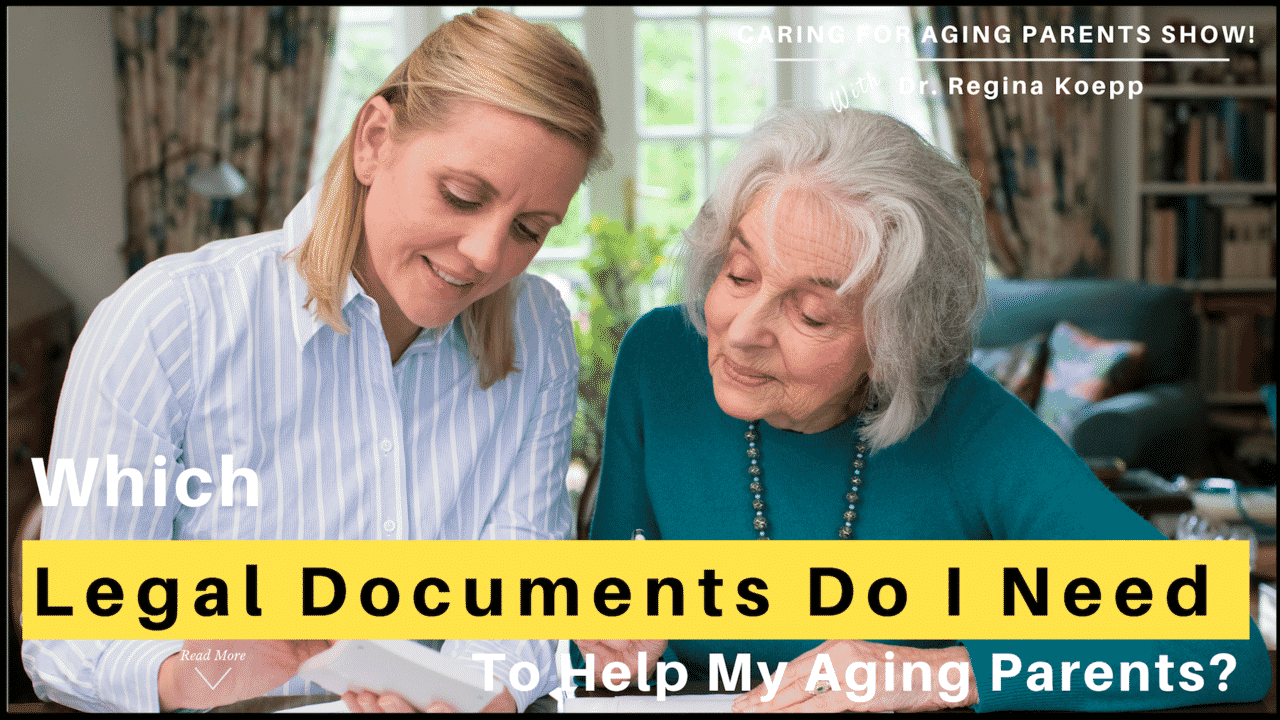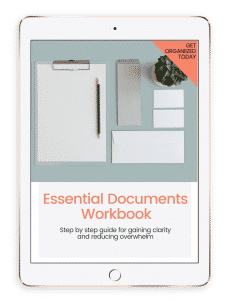Taking the time to prepare and organize documents when it comes to caring for your aging parents in the short run will set you up for smoother transitions in the long run!
Since there are so many more legal, insurance, and financial documents than the ones I included in the video, I created a comprehensive Essential Documents Workbook to accompany this blog. It’s filled with documents that you’ll want to gather to help you manage your parents’ care, including:
- legal documents
- insurance documents
- financial documents
- professional contacts
You can grab your copy here
You’ll want to gather these documents over time (but don’t wait too long). Starting this process as soon as possible is ideal. This way, you and your aging parents will have a better chance of working together as a team.
And, speaking of teamwork!
I recommend giving a copy of this checklist to your aging parents and asking them to:
1. Gather documents and store them together in a safe location
2. Show or tell you the location of these documents
3. Photocopy and give a set of copies to you
Working together with your parent will help you clear many of the obstacles you’ll face when caring for your aging parents down the road!
Now here’s the video!
Here’s an overview of the legal documents needed to care for your aging parents.
1. Advance Directives / Living Will
Advance Directives and Living Wills are similar legal documents that are notarized and state your parent’s wishes in the midst of life threatening situations or when at the end of life. For example: Do they want life sustaining measures? Do they not want to be resuscitated?
2. Durable Power of Healthcare Attorney (DPOHA)
This document includes a person (and often an alternate) who your parent has designated to be the durable power of healthcare attorney. This means means if your parent is not able to make medical decisions, then a doctor can enact the durable power of healthcare attorney, and the person whom your parent designated will be appointed to make medical decisions for your parent. This person may be you, a sibling, a friend, a partner of your parent. It just really depends who your parent designates.
3. Durable Power of Attorney
A Durable Power of Attorney (DPOA or POA) for finances is an equivalent document that’s also notarized. It identifies a person whom your parent selects to manage their finances when they are not able to.
There are many misconceptions about when the durable power of attorney can be enacted. For example, I often hear caregivers say, “my parent’s having trouble managing finances… I’m the durable power of attorney for finances, so I can take over.“
It’s important to note that a caregiver cannot decide that an aging parent is no longer capable of managing money. You may be correct, but the older adult deserves the benefit of what we call a financial capacity evaluation. Typically, a physician, a psychologist, or another licensed professional (with specific credentials) has to evaluate the older adult and determine that they are not able to manage finances and then they enact the DPOA when the older adult has been determined to lack ability to manage finances.
4. Pre-arranged funeral plans
Another set of legal documents that you want to get gathered include pre-arranged funeral plans. You’ll want to know if your parents have a funeral plot, have a description of how they want to be buried (or wish to be cremated), and what sort of ceremonial factors are important to them. You’ll want to know if they’ve already paid for this, etc.
5. Name and contact of aging parents’ attorney
If your parent has an attorney, you’ll want to be sure to gather their name and contact information.
Resource Tip:
Need to find legal assistance in your community or your aging parents’ community. Contacting your local Area Agency on Aging can help. Simply put in your zip code to find an agency near you. Link here to find your parents’ nearest Area Agency on Aging!!
6. Birth Certificate, Social Security Card, & Driver’s License or Government ID
7. Immigration Documents & Legal Documents From “Home” Country
If your parent has migrated or immigrated to the United States, it will be helpful to have their immigration documents in one place. You may also need their legal documents from their home country.
8. Passport and Residency Documents
Looking for more helpful resources on organizing documents and getting your affairs in order?
Here’s a link to an article from The National Institute on Aging on Getting Your Affairs in Order, check it out!
Here are some programs that can help you as well:
AARP
1-888-687-2277 (toll-free)
1-877-434-7598 (TTY/toll-free)
1-877-342-2277 (español/línea gratis)
1-866-238-9488 (TTY/español/línea gratis)
[email protected]
www.aarp.org/home-family/caregiving/
CaringInfo
National Hospice and Palliative Care Organization
1-800-658-8898 (toll-free)
[email protected]
www.caringinfo.org
Centers for Medicare & Medicaid Services
1-800-633-4227 (toll-free)
1-877-486-2048 (TTY/toll-free)
www.medicare.gov
Eldercare Locator
1-800-677-1116 (toll-free)
https://eldercare.acl.gov
National Academy of Elder Law Attorneys
1-703-942-5711
[email protected]
www.naela.org
National Elder Law Foundation
1-520-881-1076
[email protected]
www.nelf.org
I hope you find these tips, video, and the Essential Documents Checklist useful!




